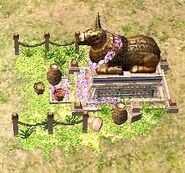Nikitazero (talk | contribs) m (→Indians) |
Nikitazero (talk | contribs) mNo edit summary |
||
| Line 1: | Line 1: | ||
| − | {{Infobox |
+ | {{Infobox AoE3 Buildings |
| ⚫ | |||
|building = Sacred Field |
|building = Sacred Field |
||
| ⚫ | |||
| ⚫ | |||
|originalgame = ''[[Age of Empires III: The Asian Dynasties|The Asian Dynasties]]'' |
|originalgame = ''[[Age of Empires III: The Asian Dynasties|The Asian Dynasties]]'' |
||
| ⚫ | |||
| ⚫ | |||
| − | |age = [[File:Ages discovery.jpg|24x18px]] [[Discovery Age]] |
||
| ⚫ | |||
| ⚫ | |||
|civs = [[Indians (Age of Empires III)|Indians]] |
|civs = [[Indians (Age of Empires III)|Indians]] |
||
| + | |age = {{Icon|Discovery}} [[Discovery Age]] |
||
| ⚫ | |||
| ⚫ | |||
| + | |time = 20 seconds |
||
| + | |builder = 8 |
||
|limit = 2 |
|limit = 2 |
||
| ⚫ | |||
| ⚫ | |||
| + | |los = 10 |
||
| + | |gatherer = 10 |
||
| + | |xpc = 63 |
||
| + | |xpk = 125 |
||
| + | }} |
||
| ⚫ | |||
| − | == |
+ | ==Overview== |
Sacred Fields increases experience generated by Indian livestock when they are tasked to it and trains [[Sacred Cow]]s for {{resources|food=125}} ({{resources|food = 100}} with Goraksha). They can also heal nearby units if The Mystical Syllable card is sent. |
Sacred Fields increases experience generated by Indian livestock when they are tasked to it and trains [[Sacred Cow]]s for {{resources|food=125}} ({{resources|food = 100}} with Goraksha). They can also heal nearby units if The Mystical Syllable card is sent. |
||
{{-}} |
{{-}} |
||
| + | ==Units== |
||
| ⚫ | |||
| + | |||
| ⚫ | |||
| ⚫ | |||
| ⚫ | |||
! scope="col" |Age |
! scope="col" |Age |
||
! scope="col" |Icon |
! scope="col" |Icon |
||
| Line 30: | Line 39: | ||
|} |
|} |
||
| − | == |
+ | ==Home City cards== |
As the Sacred Field is exclusive to the Indians, only other civilizations' TEAM cards that affects them are listed here. |
As the Sacred Field is exclusive to the Indians, only other civilizations' TEAM cards that affects them are listed here. |
||
{| class="wikitable collapsible collapsed" style="width:100%;" |
{| class="wikitable collapsible collapsed" style="width:100%;" |
||
| Line 75: | Line 84: | ||
|} |
|} |
||
| − | == |
+ | ==History== |
{{quote|As a source of food and a symbol of life in Hinduism, the cow may not be killed. According to the ancient religious text, the “Rigveda,” the cow is a goddess associated with Aditi, the mother of all gods. Therefore, slaughter is taboo. In ancient times, cows were sacrificed and their meat eaten, but never primarily for consumption, and milk-producing cows were never killed. Even during periods when meat-eating was permitted, vegetarianism was encouraged.<br/><br/>On a more practical level, slaughtering cows for beef was an extremely expensive act for sacrifice or as a gift, since the animal was a source of many important products: milk for consumption, fuel from dung, and browned butter for lamps. Later, in the early centuries CE, the cow became an appropriate gift to priests of the higher caste, or Brahmans. It was even said that killing a cow was equal to killing a Brahman.}} |
{{quote|As a source of food and a symbol of life in Hinduism, the cow may not be killed. According to the ancient religious text, the “Rigveda,” the cow is a goddess associated with Aditi, the mother of all gods. Therefore, slaughter is taboo. In ancient times, cows were sacrificed and their meat eaten, but never primarily for consumption, and milk-producing cows were never killed. Even during periods when meat-eating was permitted, vegetarianism was encouraged.<br/><br/>On a more practical level, slaughtering cows for beef was an extremely expensive act for sacrifice or as a gift, since the animal was a source of many important products: milk for consumption, fuel from dung, and browned butter for lamps. Later, in the early centuries CE, the cow became an appropriate gift to priests of the higher caste, or Brahmans. It was even said that killing a cow was equal to killing a Brahman.}} |
||
| − | == |
+ | ==Gallery== |
| − | <gallery position=center> |
+ | <gallery position=center captionalign=center> |
Sacred field.jpg|A Sacred Field |
Sacred field.jpg|A Sacred Field |
||
</gallery> |
</gallery> |
||
Revision as of 08:02, 26 January 2019
Template:Infobox AoE3 Buildings The Sacred Field is a building unique to the Indians in Age of Empires III: The Asian Dynasties.
Overview
Sacred Fields increases experience generated by Indian livestock when they are tasked to it and trains Sacred Cows for 125 food (100 food with Goraksha). They can also heal nearby units if The Mystical Syllable card is sent.
Units
Improvements
| Age | Icon | Improvement | Cost | Effect |
|---|---|---|---|---|
| Ritual Bovine | 150 wood, 150 coin | Indian livestock generates +25% XP when tasked into Sacred Fields |
Home City cards
As the Sacred Field is exclusive to the Indians, only other civilizations' TEAM cards that affects them are listed here.
| Click for a list of related Home City cards | |||||||||||||||||||||||||
|---|---|---|---|---|---|---|---|---|---|---|---|---|---|---|---|---|---|---|---|---|---|---|---|---|---|
|
Green: TEAM Shipment that is sent to each player in a team EuropeansNative AmericansAsiansIndians
|
History
| “ | As a source of food and a symbol of life in Hinduism, the cow may not be killed. According to the ancient religious text, the “Rigveda,” the cow is a goddess associated with Aditi, the mother of all gods. Therefore, slaughter is taboo. In ancient times, cows were sacrificed and their meat eaten, but never primarily for consumption, and milk-producing cows were never killed. Even during periods when meat-eating was permitted, vegetarianism was encouraged. On a more practical level, slaughtering cows for beef was an extremely expensive act for sacrifice or as a gift, since the animal was a source of many important products: milk for consumption, fuel from dung, and browned butter for lamps. Later, in the early centuries CE, the cow became an appropriate gift to priests of the higher caste, or Brahmans. It was even said that killing a cow was equal to killing a Brahman. | ” |





